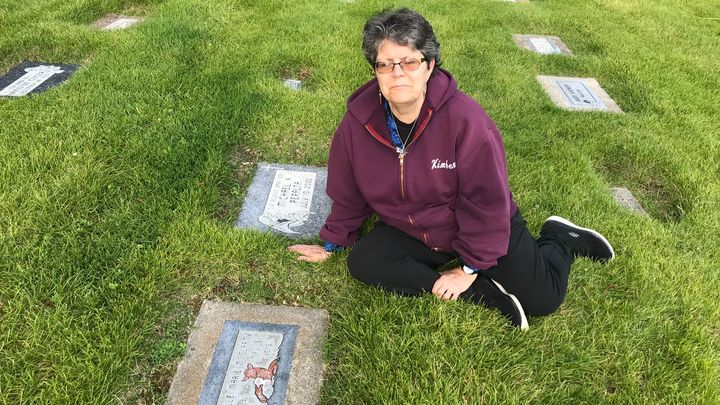
Kimberly is losing the battle with Frontotemporal Dementia
Donation protected
Our care companion, Vivian, reminded Kimberly that this would be her last day on that day (June 28, 2024). Kimberly responded that she was sad about it, but she did not comprehend that, in reality, it was Vivian’s last day.
A few minutes later, Kimberly started talking about visiting Michelle’s grave after Easter brunch. She was in tears talking about it—as it was her daughter who died of SIDS on May 31, 1976. And no, there was no Easter brunch.
That evening, I took her to visit her daughter’s grave at Holy Cross Cemetery in Spokane, WA. As we were cleaning the grave, Kimberly sat down next to the grave so she could be close to her daughter.
At that point, I realized that Kimberly was aware in her own way that she was not going to win her battle with her disease (BvFTD), and she wanted to be with her daughter.
As I put her to bed each night, I do not know if this would be the last time I would see her or hear her voice say, “Good Morning,” as she has done since we married in 1985.
What I do know is that Kimberly is getting tired every day now. Her head hurts, and she is getting dizzy more, which means her brain is shrinking at an alarming rate.

❤️Your donation helps me with respite time and allows me to hire more care companions. Kimberly requires more companionship now as she calls out to her daughter daily!
Will you donate today to help ease Kimberly’s pain and help her get ready for her next journey to heaven to be with her daughter? ❤️
Our journey with Behavioral Variant Frontotemporal Dementia Stage 2!
The familiar, “Until death do us part,” flooded my mind in October of 2022 when the neurologist diagnosed my beloved wife Kimberly with Frontotemporal Dementia (FTD). I thought, “I will lose her twice from this disease,” once when she forgot me and again when she eventually passed from it, and it devastated me.
To date, in 2024, Kimberly’s mental capacity has deteriorated to a child-like state. My soul mate, lover, and friend, Kimberly, is no longer the wife I recognize. Our shared humor, excitement for our future together, and retirement plans have been taken from us. I am now tasked with her daily care, bathing, preparing meals, assisting her in feeding, and constantly redirecting her childlike behaviors. Caring for her and ensuring she is safe is my new profession as a full-time caregiver, as her diagnosis has been upgraded to Behavioral Variant Frontotemporal Dementia (BvFTD) Stage 2.
If you see us in public and ask Kimberly how she is doing, she responds, “Great,” because nothing seems unusual to her. The reality is she cannot be trusted to be left on her own, even for a moment, because her ability to comprehend the world as an adult is no longer there. Instead, if you take a few more moments with her, you will recognize that she is childlike. The recognition can be alarming for some, such as, “How can an adult woman have the cognitive ability of a three-year-old?” The bottom line is her brain is shrinking, the disease is progressing, and her brain is wasting away. Kimberly will complain, “My head hurts, and I don’t know why,” and all I can do is comfort her.
Dementia, especially FTD, is a cruel diagnosis in many ways. First, there is no known cure for FTD, and because the diagnosis “Appears normal,” they are not treated the same as, for example, someone with a visibly recognizable terminal illness. Additionally, this is a rare disease of destruction that will take away dignity and slowly drain an individual's life and livelihood, as health insurance does not cover expenses related to FTD until a person is anticipated to have less than six months of life. When on a fixed income, these expenses feel like being tasked with climbing Mount Rainier with no training. Not to mention, I fear that something may happen to me, rendering me unable to continue to provide her with in-home loving care.
Expenses for Kimberly include being cared for by in-home care companions during the day when I am trying to run the family business. I continue to work to support her current care and anticipated future needs. The availability of care companions has recently been cut considerably while her disease continues to progress. Kimberly's care companions provide her "friends" and respite from me. They allow me to run errands and a moment of self-care. My goal is to raise awareness of FTD so that other families can seek the help and guidance they need. In addition, if you feel compelled to donate to Kimberly’s care, you may do so by clicking on the Donate Now Button. Every dollar will aid in ensuring she continues to have care companions and offers us the time she has left at home, surrounded by familiarity and love. ❤️
How You Can Make a Difference:
1. Donating: Every dollar brings us closer to our goal of providing Kimberly with essential home care.
2. Praying: Your prayers offer strength and hope in our journey.
3. Sharing: Spread our story. Awareness can bring unimaginable support.
Organizer
Leon Frechette
Organizer
Spokane, WA